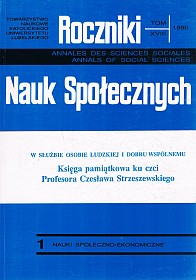Personalizm społeczny Emmanuela Mouniera
Abstrakt
The paper discusses a philosophical anthropology of Emmanuel Mounier. The first part of the paper speaks about conception of man as a person. Mounier rejected the static-substantial and traditional dualistic conception of man. Every human being is not only an individual being but also an autocreative person. The main attribute of man is a freedom which is a responsible cooperation with other men.
The second part of the paper is a general explanation of the social life’s ontology. Mounier protested against the liberal individualism and capitalistic model of social life. Before the second world war, his position toward Marxism was negative and after this war, it was ambiguous. He thought that the cooperation between Christians and Marxists in the field of economy and social life is possible.
The third part of the paper discusses Mounier’s social-activist personalism. According to him personalism is first of all an activity for the goodness of man, a social cooperation, a democratic model of the state, a rejection of every kind of man’s alienation. Mounier wanted to make a conjunction of Christian personalism and Marxist idea of social revolution.
The last part of the paper is an estimation of Mounier’s conception of personalism. His anthropology is a conglomeration of Thomism, existentialism, phenomenology and Marxism. He interpreted personalism in two ways: as an ontological theory of man-person and as an axiological idea of social community.
Copyright (c) 1990 Roczniki Nauk Społecznych

Utwór dostępny jest na licencji Creative Commons Uznanie autorstwa – Użycie niekomercyjne – Bez utworów zależnych 4.0 Międzynarodowe.


